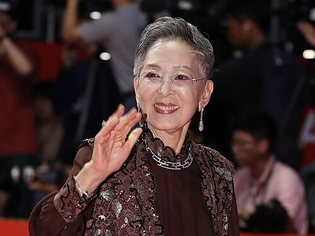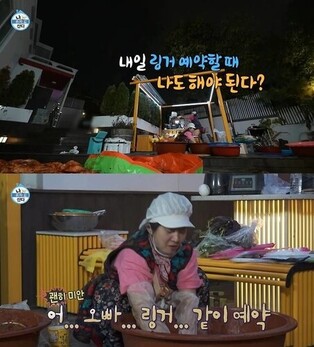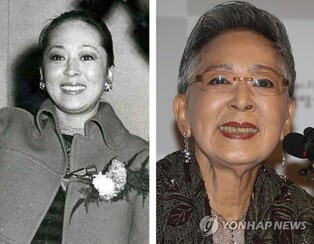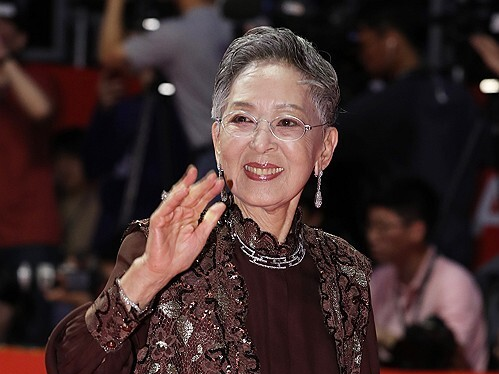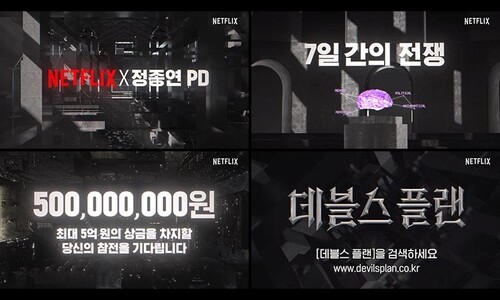 |
▲These photos, provided by Netflix, shows their show 'Devil's Plan.' (PHOTO NOT FOR SALE) (Yonhap)
|
 |
▲These photos, provided by Tving and Wavve, shows their shows 'Treasure Hunting,' and 'Button Game.' (PHOTO NOT FOR SALE) (Yonhap)
|
 |
| ▲These photos, provided by Wavve, shows their show 'Button Game.' (PHOTO NOT FOR SALE)(Yonhap) |
SEOUL, Nov. 29 (Yonhap) -- How would it be if people got the opportunity to participate in a game with a massive prize like in the drama "Squid Game?"
Psychological survival entertainment programs are continuously produced. Although the prize is not as much as in the drama "Squid Game," it goes up to 900 million KRW.
Non-celebrities show their disgrace on the program to strike it rich, and viewers sigh and cheer and immerse themselves in the program.
Some point out that these programs encourage materialism and moneyism in the process of making them entertaining.
Tving, Wavve, and Netflix continuously release psychological survival programs.
Tving will release a survival game, "Treasure Hunting," of huge scale surrounding all of Korea with a prize of 500 million KRW on December 2.
The participants of the program will go through brain and psychological games in the process of looking for the money and dividing the money.
People will have to go through survival battles every day for 15 days for their prize of 900 million KRW on Wavve's show "Button Game," which was released this month. Netflix will also release a variety show called "Devil's Plan," where people play brain games for seven days for their prize of 500 million KRW.
In fact, such survival entertainment is a format that has been steadily popular among enthusiasts in the past.
However, if programs such as "The Genius" (2015) and "Great Escape" (2021) focused on "brain games," the recent programs seem to focus more on "hunting for the prize."
In past programs, high-intelligence performers such as professional gamer Lim Yo-hwan, acupuncturist Choi Yeon-seung, and lawyer Lim Yoon-sun showed how to solve problems step by step, but recently, unknown actors who needed to pay for their parents' medical fees, failed self-employed people, fraud victims, and people who desperately needed money put in their whole effort to win the survival.
Prizes have increased a lot, and most of the programs have prizes worth more than 100 million dollars.
Wavve's original show "Game of Blood," which first aired in November last year, offered a total prize money of 300 million won, while Channel A's "Penthouse," which ended in October, offered 400 million won. Tving and Netflix took a step further, raising their total prize money to up to 500 million won and Wave to 900 million won.
A fierce competition for money is pointed out as encouraging materialism and competition.
The biggest feature of these psychological survival programs is that participants compete fiercely, regardless of whether they are good or bad.
In "Button Game," a male participant claims unity among men, saying, "Let's drop the women and go," and in "Treasure Hunt," participants purposely mislead other teams and block the door to prevent them from entering.
It is analyzed that survival entertainment programs that reveal human's original desire for money are gaining popularity because they also contain the appearance of our society wishing for a "strike."
Lee Heon-yul, a professor of media and communication at Korea University, pointed out, "In the past, programs that offered prize money bypassed money by converting them into home appliances or donating half of the prize money rather than giving them in cash, but these days, we focus on prize money."
He explained, "The phenomenon that this type of survival program is gaining popularity reflects the social situation in which money becomes a measure of success and "quick money" is taken for granted."
Critics say that psychological survival programs, which include humans' honest desire for money and bold choices and attempts that are driven to the limit, encourage materialism by riding on the reality that excessive competition has become common.
Kim Sung-soo, a pop culture critic, pointed out, "The survival game, in which ordinary people gathered in a closed space bet a large amount of prize money, has reached the end of the reality program's last stimulus," adding, "The psychological survival program that seeks only peripheral stimulation can be harmful."
(This article is translated from Korean to English by Dowon Kim.)
(END)
(C) Yonhap News Agency. All Rights Reserved




















